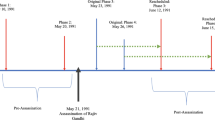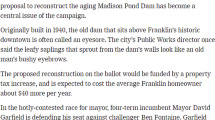Abstract
Most economists agree that the price system offers the best method for allocating scarce resources among competing ends. Yet, churches, nonprofits, governments, and corporations in disaster-stricken communities, often under voluntary or mandated price freezes, must often rely on nonprice responses to meet short-term, localized shifts in demand. Evidence suggests that the private sector outperforms the public sector at this task. This paper explores how private sector organizations, both nonprofit and for-profit, learn about and respond to community needs in the aftermath of disasters. We explain and demonstrate how organizations observe credible signals of shifts in demand without the aid of prices. Our findings expand our understanding of why public sector disaster recovery efforts tend to be less effective than private sector efforts. We also find that price gouging laws have additional negative consequences beyond the standard economic account.


Similar content being viewed by others
Notes
Field interviews in Joplin and Tuscaloosa were conducted between September 2011 and February 2012 under a protocol approved by the Institutional Review Board at Troy University.
The problems revealed in Katrina were not new; FEMA’s response to Hurricane Andrew in 1992 was also criticized as slow and ineffective (Pielke and Pielke 1997, 10–13).
Because government agencies rely on tax dollars and do not have to compete for donations, selection should increase the relative effectiveness of private versus public sector responses.
Concern over the potential for price gouging often implicitly assumes highly inelastic postdisaster demand as well.
The costs would be small relative to the operations of a major retailer. Maintaining prices while meeting disaster-induced demand could be also viewed as a form of corporate advertising or analogous to charitable contributions to earn goodwill (Samuels and Puro 1991). Walmart instituted a price-freeze policy in 2004 to specifically avoid accusations of price gouging following natural disasters (Rosegrant 2007a).
See Rosegrant (2007b) for a discussion of FEMA’s attempt to prepare for hurricanes during the 2006 season.
See the application form available at www.disasterassistance.gov. Much Stafford Act aid goes to local governments and not individuals, while other individual assistance is available via low interest loans from the Small Business Administration.
References
Alchian, A. (1950). Uncertainty, evolution, and economic theory. The Journal of Political Economy, 58(3), 211–221.
Andreoni, J. (1990). Impure altruism and donations to public goods: a theory of warm-glow giving. The Economic Journal, 100(401), 464–477.
Beito, D. (2000). From mutual Aid to the welfare state. Chapel Hill: University of North Carolina Press.
Beito, D., Gordon, P., & Tabarrok, A. (2002). The voluntary city: Choice, community, and civil society. Ann Arbor: The University of Michigan Press and The Independent Institute.
Boettke, P. J., & Leeson, P. T. (2005). Still impossible after all these years: reply to caplan. Critical Review, 17(1/2), 155–170.
Boettke, P. J. & Prychitko, D.L. (2004). Is an independent nonprofit sector prone to failure? Conversations on Philanthropy, I, 1–40
Boettke, P. J., & Smith, D. J. (2010). Private solutions to public disasters: Self- reliance and social resilience. In W. Kern (Ed.), The economics of natural and unnatural disasters (pp. 87–102). Kalamazoo: W.E. Upjohn Institute.
Brewer, M. (2006–2007). Planning disaster: Price gouging statutes and the shortages they create. Brooklyn Law Review, 72(1), 1101–1138.
Carden, W. A. (2009). Sound and fury: Rhetoric and rebound after Katrina. Journal of Business Valuation and Economic Loss Analysis, 4(2).
Chamlee-Wright, E. (2010). The cultural and political economy of recovery: Social learning in a post-disaster environment. Abingdon, Oxon and New York: Routledge.
Chamlee-Wright, E., & Myers, J. (2008). Social learning in non-priced environments. Review of Austrian Economics, 21(2–3), 151–166.
Chamlee-Wright, E., & Storr, V. H. (2009). Club goods and post-disaster community reform. Rationality and Society, 21(4), 429–458.
Chamlee-Wright, E., & Storr, V. H. (Eds.). (2010). The political economy of hurricane Katrina and community rebound. Cheltenham, UK and Northampton, MA: Edward Elgar.
Chamlee-Wright, E., & Storr, V. H. (2011). Social capital, lobbying and community-based interest groups. Public Choice, 149(1–2), 167–185.
Chappell, W. F., Forgette, R. G., Swanson, D. A., & Van Boening, M. V. (2007). Determinants of government aid to Katrina survivors: evidence from survey data. Southern Economic Journal, 74(2), 344–362.
Congleton, R. (2006). The story of Katrina: New Orleans and the political economy of disaster. Public Choice, 127(1/2), 5–30.
Corneulle, R. C. (2011). Reclaiming the American dream. New Brunswick and London: Transaction Publishers.
Cowen, T., & Tabarrok, A. (2015). Modern principles: Microeconomics (3rd ed.). New York: Worth Publishers.
Coyne, C., & Lemke, J. (2011). Polycentricity in disaster relief. Studies in Emergent Orders, 4, 40–57.
Culpepper, D., & Block, W. (2008). Price gouging in the Katrina aftermath: free markets at work. International Journal of Social Economics, 35(7), 512–520.
Fessler, P. (2013). Thanks, but no thanks: When post-disaster donations overwhelm. NPR. 9 January 2013. Available. Online. <http://www.npr.org/2013/01/09/168946170/thanks-but-no-thanks-when-post-disaster-donations-overwhelm>(accessed May 25, 2016).
Garrett, T. A., & Sobel, R. S. (2003). The political economy of FEMA disaster payments. Economic Inquiry, 41(3), 496–509.
Gode, D. K., & Sunder S. (1993). Allocative efficiency of markets with zero-intelligence traders: market as a partial substitute for individual rationality. Journal of Political Economy, 101(1), 119–137.
Grube, L. & Smith, D. J. (2014). Damage control: Improper uses of disaster aid follow like day to night. The Freeman. 14 February 2014. Available. Online. <https://fee.org/articles/damage-control/>(accessed May 25, 2016).
Grube, L., Haeffele-Balch, S., & Storr V. H. (2014a). Social learning in Rockaway, New York after Hurricane Sandy. George Mason University Working Paper. Available. Online. < http://www.thephilanthropicenterprise.org/wp-content/uploads/2014/10/Haeffele-Balch-et-al-Working-Paper-TPE-2014.pdf>(accessed May 25, 2016).
Grube, L., Haeffele-Balch, S., & Storr, V. H. (2014b). The private in the Ostroms’ polycentrism: A case study of post-Sandy recovery in one Orthodox Jewish community. George Mason University Working Paper. Available. Online. < http://www.thephilanthropicenterprise.org/wp-content/uploads/2014/10/Grube-et-al-Working-Paper-TPE-2014.pdf>(accessed May 25, 2016).
Hayek, F. A. (1945). The use of knowledge in society. American Economic Review, 35(4), 519–530.
Horwitz, S. (2008). Making hurricane response more effective: Lessons from the private sector and the Coast Guard during Katrina. Mercatus Policy Series, Policy Comment No. 17. Available. Online. < http://mercatus.org/publication/making-hurricane-response-more-effective-lessons-private-sector-and-coast-guard-during>(accessed May 25, 2016).
Horwitz, S. (2009a). Walmart to the rescue: private enterprise’s response to hurricane Katrina. The Independent Review, 13(4), 1086–1653.
Horwitz, S. (2009b). Doing the right things: The private sector response to hurricane Katrina as a case study in the bourgeois virtues. In M. D. White (Ed.), Accepting the invisible hand: Market-based approaches to social-economic problems (pp. 169–190). New York: Palgrave Macmillan.
Horwitz, S. (2011). A jambalaya of thoughts on non-price signals, commercial spaces, and lessons learned from Katrina: a review essay on Emily chamlee-Wright’s The cultural and political economy of recovery: social learning in a post-disaster environment. Studies in Emergent Order, 4, 78–86.
Kiesling, L. (2015). The knowledge problem. In P. J. Boettke & C. J. Coyne (Eds.), The oxford handbook of Austrian economics (pp. 45–64). New York: Oxford University Press.
Lavoie, D. (2015). Rivalry and central planning: The socialist calculation debate reconsidered. Arlington: Mercatus Center at George Mason University.
Lee, D. (2015). Making the case against ‘price gouging’ laws: a challenge and an opportunity. The Independent Review, 19(4), 583–598.
Leeson, P. T., & Sobel, R. S. (2008). Weathering corruption. Journal of Law and Economics, 51(4), 667–681.
Lohmann, R. A. (1992). The commons: New perspectives on nonprofit organizations and voluntary action. San Francisco: Jossey-Bass.
Mas-Colell, A., Whinston, M. D., & Green, J. (1995). Microeconomic theory. Oxford: Oxford University Press.
Montgomery, D. W., Baron, R. A., & Weisskopf, M. K. (2007). Potential effects of proposed price gouging legislation on the cost and severity of gasoline supply interruptions. Journal of Competition Law & Economics, 3(3), 357–397.
Munger, M. (2007). They clapped: Can price-gouging laws prohibit scarcity? 8 January 2007. Online: Library of Economics and Liberty. Available. <http://www.econlib.org/library/Columns/y2007/Mungergouging.html> (accessed May 25, 2016).
Murray, C. (1984). Losing ground. New York: Basic Books.
Palmer, T. G. (2012). After the welfare state. Ottawa: Jameson Books, Inc.
Pielke, R. A., Jr., & Pielke, R. A., Sr. (1997). Hurricanes: Their nature and impacts on society. Chichester: Wiley.
Rosegrant, S. (2007a). Walmart’s response to Hurricane Katrina: Striving for a public-private partnership. Kennedy School of Government Case Program C16–07–1876.0
Rosegrant, S. (2007b). Walmart’s response to Hurricane Katrina: Striving for a public-private partnership (sequel). Kennedy School of Government Case Program C16–07–1876.1
Rubin, P. (1991). Managing business transactions: controlling the cost of conducting, communicating, and decision making. New York: Free Press.
Samuels, W. J., & Puro, E. (1991). The problems of price controls at the time of natural disasters. Review of Social Economy, 49(1), 62–75.
Shughart, W. F. (2006). Katrinanomics: the politics and economics of disaster relief. Public Choice, 127(1/2), 31–53.
Shughart, W. F. (2011). Disaster relief as bad public policy. The Independent Review, 15(4), 519–39.
Skarbek, E., & Green, P. R. (2011). Associations and order in the cultural and political economy of recovery. Studies in Emergent Order, 4, 69–77.
Skarbek, E. (2014). The Chicago fire of 1871: a bottom up approach to disaster relief. Public Choice, 160(1), 155–180.
Skarbek, E. (2015). Aid, ethics, and the Samaritan’s dilemma: strategic courage and constitutional entrepreneurship. Journal of Institutional Economics, 12(2), 1–23.
Smith, D. J., & Sutter, D. (2013). Response and recovery after the Joplin tornado: lessons applied and lessons learned. The Independent Review, 18(2), 165–188.
Sobel, R. S., & Leeson, P. T. (2006). Government’s response to hurricane Katrina: a public choice analysis. Public Choice, 127(1/2), 55–73.
Sobel, R. S., & Leeson, P. T. (2007). The use of knowledge in natural-disaster relief management. The Independent Review, 11(4), 1086–1653.
Sowell, T. (1980). Knowledge and decisions. New York: Basic Books.
Storr, V. H., Haeffele-Balch, S., & Grube, L. (2015). Community revival in the wake of disaster. New York: Palgrave Macmillan.
Sutter, D. (2014). Virtual coordination of the philanthropic response to disasters. Johnson Center Working Paper. Available online: http://www.thephilanthropicenterprise.org/wp-content/uploads/2013/11/Sutter-Working-Paper-TPE-2014.pdf
Author information
Authors and Affiliations
Corresponding authors
Additional information
This paper uses field interviews conducted in Joplin and Tuscaloosa that were conducted between September 2011 and February 2012 under a protocol approved by the Institutional Review Board at Troy University. The financial support for the field work conducted by the authors was generously provided by the Mercatus Center at George Mason University. The authors thank two anonymous referees for providing helpful comments.
Rights and permissions
About this article
Cite this article
Sutter, D., Smith, D.J. Coordination in disaster: Nonprice learning and the allocation of resources after natural disasters. Rev Austrian Econ 30, 469–492 (2017). https://doi.org/10.1007/s11138-016-0369-5
Published:
Issue Date:
DOI: https://doi.org/10.1007/s11138-016-0369-5




